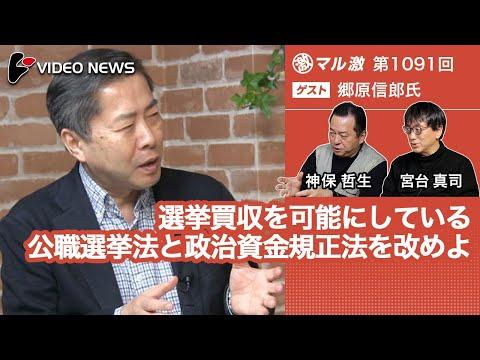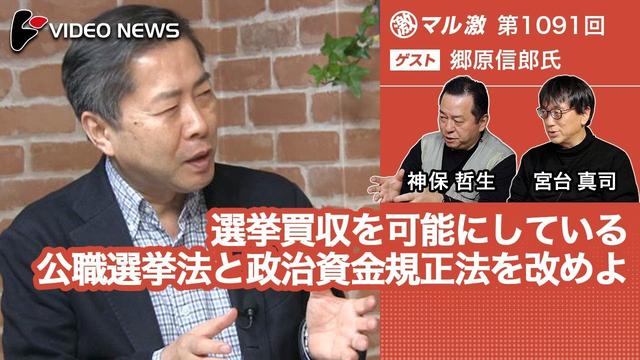
Revise the Public Offices Election Act and the Political Funds Control Act that enable election acquisitions / Nobuo Gohara (lawyer)
(↑ Click the image to play the video.) When did Japan become a country where election acquisitions can be taken for granted? This was considered an exceptional case when it was revealed in the previous Upper House election that a blatant election acquisition was made in the Hiroshima constituency. The House of Councilors Hiroshima at that time was the second candidate for the Liberal Democratic Party in order for the Abe administration, who wanted power at the time, to kick off the incumbent Liberal Democratic Party member Kensei Mizote, who had repeatedly made critical remarks against the administration. This is because money was poured in like hot water in order to win the wife of the Minister of Justice, Katsuyuki Kawai, who was forced to stand up. As a result of the investment of 150 million yen, Mr. Kawai was brilliantly elected, but after that, Katsuyuki and Mr. and Mrs. Kawai were arrested and charged with the election acquisition, and the guilty was confirmed. .. However, it seems that Hiroshima was not always an exception. In the House of Representatives election in October last year, a member of the House of Representatives Hirohiko Izumida, an official candidate of the Liberal Democratic Party in the 5th district of Niigata, accused him of being requested by Isao Hoshino, a member of the House of Representatives who is nicknamed "Don of Niigata". ing. Mr. Izumida recorded Mr. Hoshino asking for illegal spending while saying, "Let's spend the necessary expenses as soon as possible. Don't spare 20 or 30 million money and throw your life." , The voice is open to the public. And this February, Mr. Izumida has filed a criminal accusation against Mr. Hoshino. Furthermore, coming here, cases of suspecting a large-scale election acquisition have surfaced in the elections of both houses of the Diet in Kyoto. Here, all the members of the Kyoto-elected Liberal Democratic Party donated millions to 10 million yen of money to the party's Kyoto Prefectural Federation, which was passed on to related organizations of the prefectural and city councils from 50 people. It is suspected that if the candidate handed over the money directly to the prefectural assembly or city council, there was a risk of an acquisition, or because it was suspected that the source of the money was obscured by passing through the prefectural federation. The case is called "Kyoto Maneron Suspicion". In a series of incidents, many local councilors who received the money plainly said, "I received the money, but it was not acquired." The fact that it was not recognized as an acquisition shows the seriousness of the pathology. Before I knew it, it became clear that Japan's elections were greatly distorted at a very deep-seated level. Nobuo Gohara, a lawyer who is familiar with the election acquisition of the Public Offices Election Act, said that the de facto acquisition funds that are clearly being spent in the election will be treated as political activity expenses "to expand the party". So, I consider the current situation that the interpretation that it does not conflict with the Public Offices Election Law is widespread. Even if it is not a slush fund or illegal funds, if money is allowed to be paid to the head of the municipality where the constituency is located, the prefectural assembly, and the city council to cooperate in the election, the candidates with financial power are overwhelming. Will be advantageous to. It is clear that this is a problem that shakes the foundation of democracy. Mr. Gohara says that Article 199 of the current Public Offices Election Act, which stipulates acquisitions, prohibits candidates from making donations to political parties and their branches for a certain period of time before the election, but donations to political parties and their branches. The Public Offices Election Act should be amended to ban candidates from donating to political parties or branch offices for a period of time (eg 180 days) before the election, noting that there is a problem with not banning. Says. Also, in an interview with Video News.com, Professor Tomoaki Iwai of Nihon University, who is familiar with politics and money issues, said that political contributions to individual politicians distorted politics in the Recruit and Sagawa Kyubin cases. The problem that the current Political Funds Control Act, which was revised in 1994 in response to the fact that it became clear, has become a mere ghost, with many loopholes being created over the course of nearly 30 years. Point out. The current Political Funds Control Act prohibits corporate and group contributions to individual politicians, but the political fund groups called "party branches" established in each constituency are, in effect, individual incumbents in that constituency. It is built so that it can be used as a wallet. Since it is legally possible for companies and organizations to donate up to 100 million yen to political fund groups, the original purpose of the law, "Prohibition of corporate group donations" for individual politicians, is quite complete. It can't be done. After all, the interpretation repeats the nonsense that the election acquisition funds will be used as political activity expenses to expand the party, or as legal donations to individual politicians named "party branches". In the meantime, democracy is constantly distorted by repeating things like cracking down on speed violations in automobiles, such as Hiroshima, where if you overdo it a little, the law will occasionally come down. Not only that, the political distrust of voters is only increasing. It may be time to review the Political Funds Control Act, which has been enacted as a colander, and change the current situation in which the Political Funds Control Act and the Public Offices Election Act are used properly depending on the circumstances of politicians. This week, with Mr. Gohara, a journalist will discuss what should be changed after reexamining the problems of the current Public Offices Election Law, which enables election acquisition, and the Political Funds Control Law, which has become a colander law. Tetsuo Jinbo and sociologist Shinji Miyadai discussed. [Profile] Nobuo Gohara Attorney Born in Shimane Prefecture in 1955. Graduated from the Faculty of Science, University of Tokyo in 1977. After working for Mitsui Mine Co., Ltd., he passed the bar examination in 1980. 1983 Prosecutor. He retired in 2006 after working for the Tokyo District Public Prosecutor's Office, the Hiroshima District Public Prosecutor's Office Special Criminal Director, the Nagasaki District Public Prosecutor's Deputy Prosecutor, and the Tokyo District Public Prosecutor's Office. Established Gohara Sogo Law Office (currently Gohara Sogo Compliance Law Office) in 2008. In 2010, he was a member of the Ministry of Justice's "Prosecution's Way of Examining Committee". His books include "Dialogue with" Deep "Carlos Ghosn: In a Country Where More than 99% Are Convicted If Prosecuted", "Prosecution Collapse and Lost Justice". Shinji Miyadai Professor / Sociologist, Tokyo Metropolitan University Born in Sendai in 1959. He completed the doctoral course at the University of Tokyo Graduate School. He is a doctor of sociology. He worked as an assistant professor at Tokyo Metropolitan University and an associate professor at Tokyo Metropolitan University before assuming his current position. His specialty is social system theory. (The doctoral dissertation is "The Theory of Anticipation of Power.") His books include "The Difficulties of Japan," "Sociology from the Age of 14," "From Justice to Enjoyment-Movies Uncover Modern Illusions-", "Where Are We From?" Where are you coming and where are you going? ”, Co-authored“ A country where democracy has never existed, Japan ”. Tetsuo Jinbo Journalist / Video News.com Representative / Editor-in-Chief Born in Tokyo in 1961. Completed the master's program at the Graduate School of Journalism, University of Columbia in 1987. After working as a reporter for the Christian Science Monitor and Associated Press in the United States, in 1999 he opened the news-specialized Internet broadcasting station "Video News.com" and became the representative. His books include "Mine Report", "Tuvalu Global Warming Country", "PC Remote Control Incident", and his translations include "The End of Food" and "DOPESICK America's Opioid Crisis". [About Video News.com] Since Video News.com believes that an advertising-independent management base is indispensable for truly public coverage, news operated by viewing fees from members. It is a specialized internet broadcasting station. ----- (This article is a program introduction of the Internet broadcasting station "Video News.com".)

